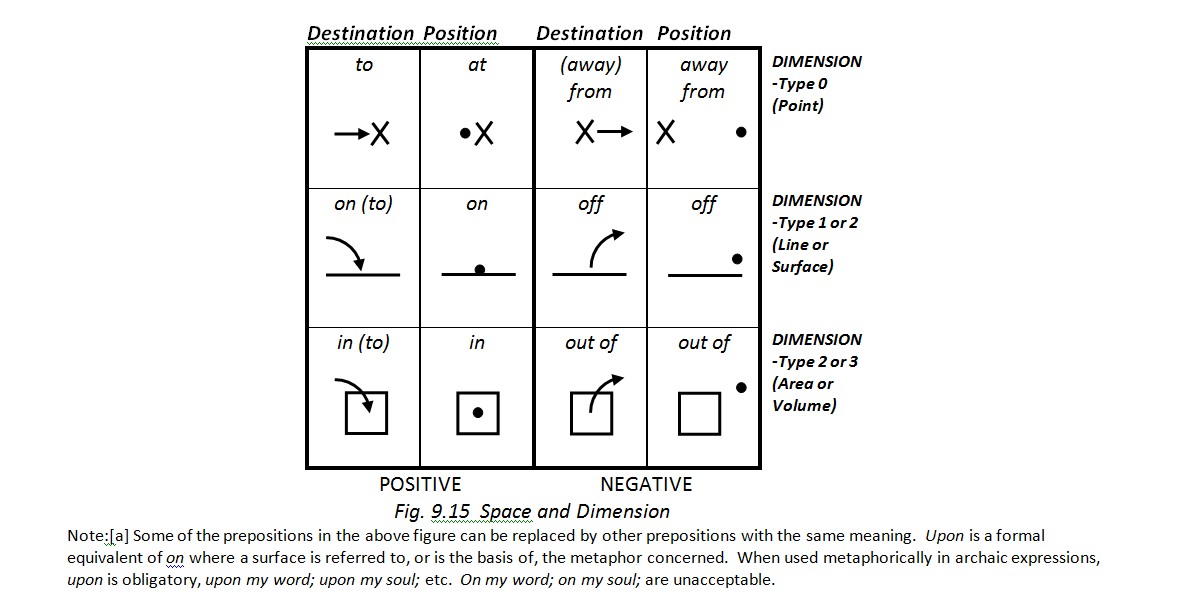Dear Vikral,
I cannot see your Post on the Forum, so I am reposting it.
http://www.eslprintables.com/forum/topic.asp?id=27909
Your question was:
´┐ŻHi. Can you please tell me the difference in the use of prepositions ´┐Żon ´┐Ż and ´┐Żupon ´┐Ż? Thanks in advance. Have a nice day´┐Ż.
In ´┐ŻA Comprehensive Grammar of the English Language´┐Ż, Professors Quirk, Greenbaum, Leech, Svartvik, and Crystal use 63 pages to explain Prepositions, apart from numerous other references.
On pages 665-667 they discuss 72 common prepositions with their uses.
´┐ŻOn´┐Ż reads Space; Time Position; Target; Means and Instrument; Respect; Subject Matter.
´┐ŻUpon´┐Ż reads: [formal] (see ´┐Żon´┐Ż above).
´┐ŻIn´┐Ż reads Space; Time Position; Measurement into the Future.
´┐ŻInto´┐Ż reads Space; Movement.
Here is a diagram of some of these prepositions, on Page 674.

These two prepositions, ´┐Żon´┐Ż and ´┐Żupon´┐Ż, are not equally interchangeable. Why? Because ´┐Żon´┐Ż is informal and ´┐Żupon´┐Ż is formal. Because of the above diagram. Because of the above note.
The general meaning of both words is the same, but they are used differently, so they are not interchangeable. In general terms, the first is used informally; the second is used only in formal speech and writing.
The ´┐ŻOxford Dictionary of English´┐Ż gives:
UPON: preposition - more formal term for ON especially in abstract senses: ´┐Żit was based upon two principles´┐Ż; ´┐Ża school´┐Żs dependence upon parental support´┐Ż.
USAGE: The preposition UPON has the same core meaning as the preposition ON. However, in modern English upon tends to be restricted to more formal contexts or to established phrases and idioms, as in ´┐Żonce upon a time´┐Ż and ´┐Żrow upon row of seats´┐Ż.
Although it wasn´┐Żt part of your question, the two prepositions, ´┐Żin´┐Ż and ´┐Żinto´┐Ż, are also not equally interchangeable. ´┐ŻIn´┐Ż has 3 uses; ´┐Żinto´┐Ż has only 2 uses. The diagram above shows that ´┐Żin´┐Ż and ´┐Żinto´┐Ż are interchangeable only in relation to Destination, but not Position.
Language is a means of communication --- a way of passing information from person ´┐ŻA´┐Ż to person ´┐ŻB´┐Ż. There is a variety of methods of conveying the information, but there is no ´┐Żcorrect´┐Ż way of doing this. The important factor is that ´┐ŻB´┐Ż correctly receives the message sent by ´┐ŻA´┐Ż. The route is almost irrelevant.
The choice of prepositions in a language, (almost all languages), is not easy. Their use is not usually dependent on one simple rule which covers every situation.
Because English is a fusion of several languages, each with its own rules of spelling, pronunciation, etc. it causes certain problems in learning English. Moreover, there is not one English language, there are several --- British English, Australian English, Indian English, American English, etc. That is why I sometimes find myself uncomfortable when Teachers say: ´┐ŻThis is correct, but that is incorrect´┐Ż.
Whether something is ´┐Żcorrect´┐Ż or not, depends on so many unknown factors!
´┐ŻTell me Vikral, what is the correct way to travel from London to Delhi?´┐Ż
Unless I specify certain conditions, such as price, distance, time, etc. my question, which requires a correct answer, is meaningless and, therefore, stupid.
You, Vickral, would have to begin your answer with: ´┐ŻIt all depends on what you mean by ´┐Żcorrect´┐Ż. If you mean ´┐Żcheapest´┐Ż then --- first, take a bus to London Underground, and then ... ´┐Ż
When there is a grammar question on the Forum, is the questioner asking about everyday speech? Does he/she want to hear what ordinary people say? Is it a question about the speech that many people use, ungrammatically, on many occasions during their lifetime?
(Knock, knock). ´┐ŻWho´┐Żs that?´┐Ż ´┐ŻIt´┐Żs me´┐Ż.
Or does he/she want a ´┐Żgrammatically correct answer´┐Ż? Must the answer be in accordance with the Model Answers in the ´┐ŻXYZ Book of Grammar´┐Ż which has been specified to be used by the Examination Board?
(Knock, knock). ´┐ŻWho is that?´┐Ż ´┐ŻIt is I´┐Ż. (´┐ŻBecause I am at the door´┐Ż).
In the ´┐Żcorrect´┐Ż situation, they are both ´┐Żcorrect´┐Ż.
When I answer a question, I try to remember that not all Members of ESLP have the same advanced academic knowledge that others, more fortunate, have. Nor have they access to reference material ´┐Ż dictionaries, grammar books, etc. Many Teachers work in extremely difficult situations.
Thank you for making your question so clear.
I hope that I have been able to help you.
Les